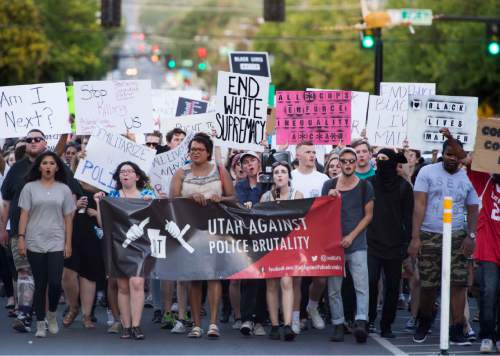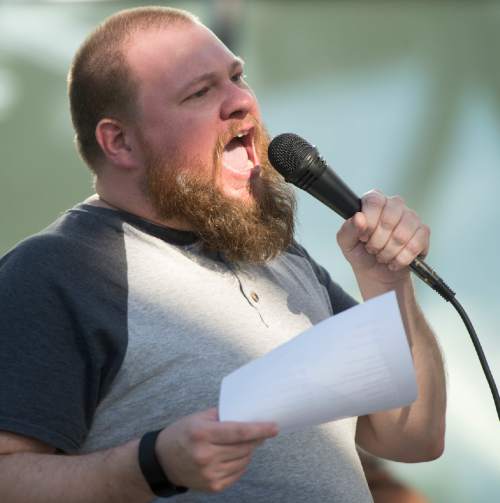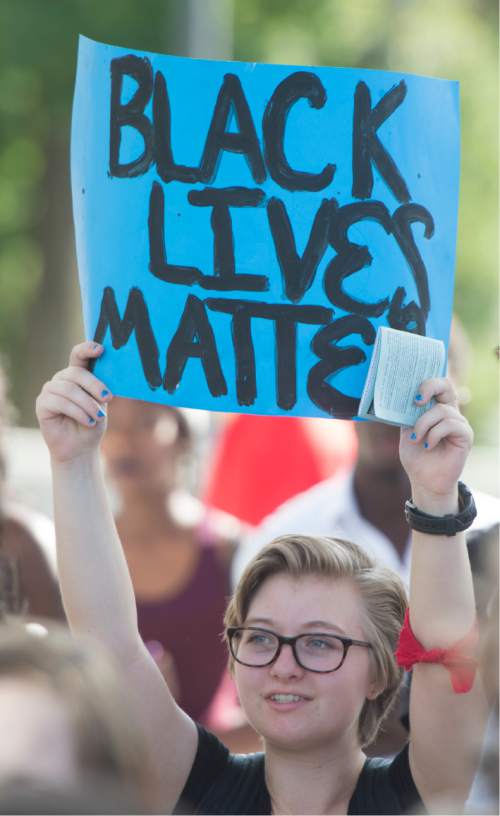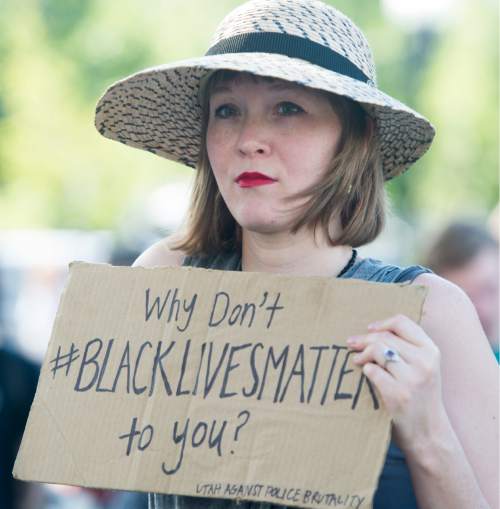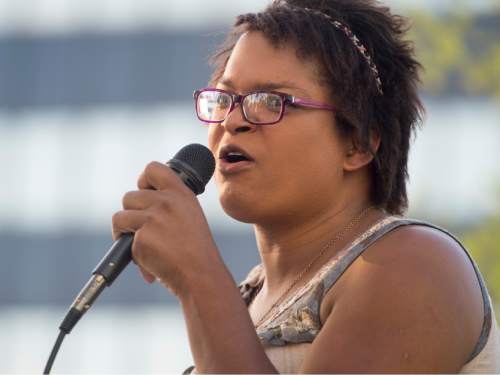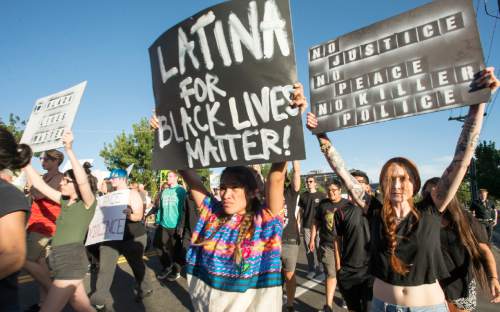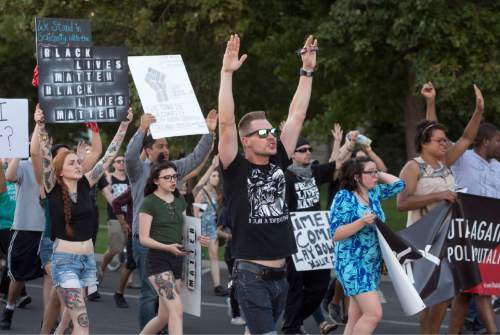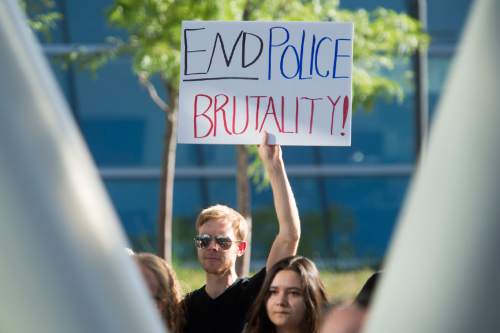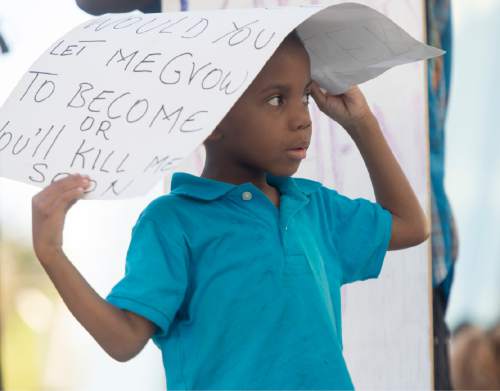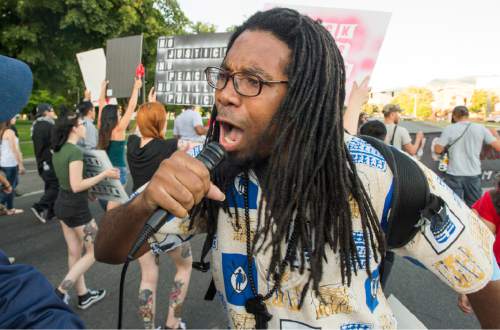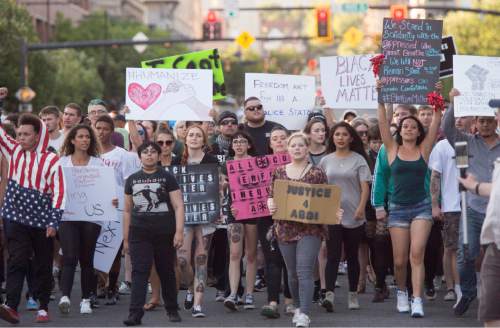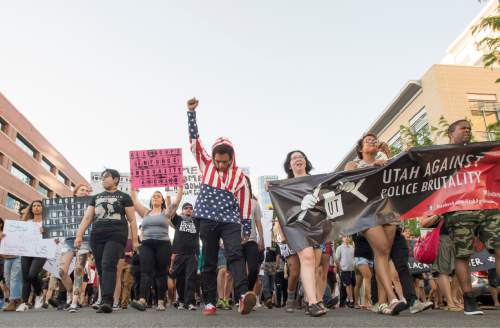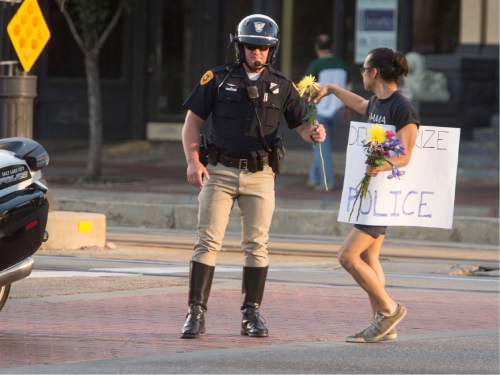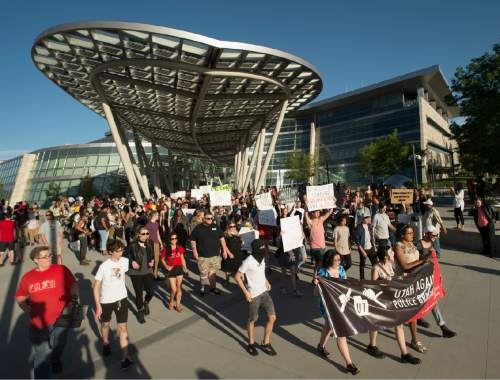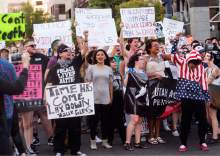This is an archived article that was published on sltrib.com in 2016, and information in the article may be outdated. It is provided only for personal research purposes and may not be reprinted.
A man wearing a black bandana held a sign that said "Time has come. Lay down your guns."
A woman weaved through the crowd passing out small, blue "know your rights" pamphlets. A black teenager carried a poster that asked "Am I next?" Most shouted "hands up, don't shoot." And they all marched together.
This is what the second and larger of two peaceful protests held in Salt Lake City on Saturday looked like. More than 200 people gathered at the Public Safety Building at 475 S. 300 East to rally against the recent fatal shootings of two black men — Alton Sterling in Louisiana and Philando Castile in Minnesota — at the hands of police. Similar protests were held across the country.
Both cases reignited unease over the slew of people of color killed by police in the past few years — including Michael Brown in Ferguson, Tamir Rice in Cleveland and Eric Garner in New York — spurring rallies and protests nationwide.
Hayven Jackson, the African American emcee for the rally at 6 p.m., called the recent incidents "unacceptable" and condemned the "supposed peace officers" who perpetrated them.
"It's so easy to go about your little white lives in little white Utah and not notice these killings," Jackson said as the crowd cheered. "But you don't matter today because black lives matter."
Black Lives Matter, an advocacy movement started in 2013, had a strong presence at the event. Lex Scott, an organizer with the group and a black woman, focused her comments on police brutality.
"We're not going to let you keep killing us," she said, sporting a pistol holstered with black straps around her right leg. "We deserve to live in this country."
Scott also mentioned the peaceful demonstration in Dallas on Thursday that ended when a black man, identified as 25-year-old Micah Johnson, shot and killed five white police officers. Johnson was purportedly upset at the racial friction between law enforcement and black people.
"We don't shoot cops," Scott said. "That guy who shot cops can go to hell. All that did was put a bigger target on our backs."
After more than an hour of speeches, moments of silence and call-and-response shouts of "we have a right to rebel," the crowd walked to Salt Lake County District Attorney Sim Gill's office near 300 S. State St. demanding justice. They shut down each street they marched on as police motorcades stopped cars.
At the front of the march was 20-year-old Jacobo Funes, a Latino. With the hood up on his American flag-patterned jacket, Funes walked silently, holding up his fist almost the entire time.
"It's not right what they're doing," he said as the group arrived at Gill's office. Those protesting believe Gill has withheld information on police brutality cases in Utah, including the shooting of 17-year-old Abdullahi Omar Mohamed in Salt Lake City and the recent video leaked online that shows an officer beating and berating a woman during an arrest.
The group called for Gill's resignation, shouting "Gill has got to go" at the reflective glass building on State Street that hosts his office.
Protesters stopped briefly at the intersection of Rosa Parks Boulevard (200 East) and Cesar Chavez Boulevard (500 South); the confluence of streets named for social rights activists of color seemed to represent their calls for justice.
The demonstration was not without tension, though. At times, passers-by interrupted the speakers to say that all lives, including white lives, matter. Each time murmurs shot through the crowd advising the individual to leave.
Jenna Lee Martin, a 16-year-old white girl from Salt Lake City, stood alone on a table top in a small stand-off against three men wearing Donald Trump T-shirts. Her sign read "Black Lives Matter," their sign "All Lives Matter." She didn't back down.
A white man carrying a sign with the ten commandments confronted Jackson, who told the man "I'm sick of bigotry" before shooing him away.
Malcolm Koffi, a Salt Lake City resident, brought to the rally his 5-year-old son Samory, who he fears will grow up in a society that judges him for his black skin.
"I'm in pain," Koffi said, noting that police have stopped him six times in the past year, which he believes was due to racial profiling. "What is left for the black man to do in this justice system?"
At the earlier protest, which started at noon, there was a similar atmosphere.
"The answer to guns is not more guns," said Deyvid Morales, who directed and emceed the event. "The answer to stop this violence is to peacefully talk things out, to come together as a community. ... We just want peace."
People from multiple ethnicities and backgrounds gathered to lend support. Carl Moore, who came from Orem for the rally, did a dance in traditional American Indian clothing, which he said was a tribute for all people who belong to the human race.
"When I see this 'All Lives Matter,' what it does is it dilutes the situation," Moore said. "What we're doing right now is Black Lives Matter."
No officers in uniform attended the afternoon rally, but Lycha Andrews, also known as Lala Montfleury, is an outreach specialist with Unified Police Metro Gang Unit, she said.
Andrews led chants as protesters walked for several blocks, impeding traffic for a few minutes on 400 South between 400 East and 200 East.
She felt it was important to be at the rally and act as a liaison between law enforcement and those who feel marginalized by them.
Once, a protester stood in front of a cement truck that was honking at the protesters. The driver used his hose to spray them with water.
Despite the animosity, some protesters urged consensus between people of color and police. Jared Urbina, a Latino who does not identify as either male or female, handed a yellow flower to an officer guarding the later march as it ended about 8 p.m.
"I'm tired of fighting," Urbina said. "It was just easier to give away a flower."
Twitter: @CourtneyLTanner


